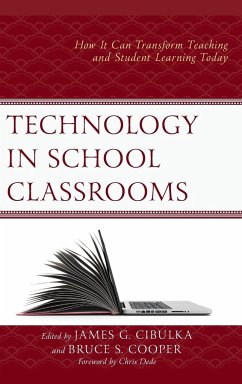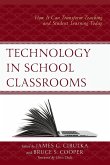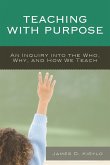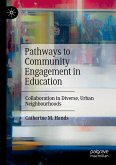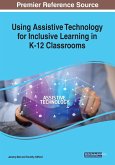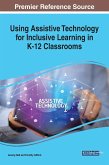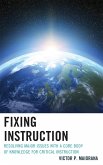Technology in School Classrooms
How It Can Transform Teaching and Student Learning Today
Herausgeber: Cibulka, James G.; Cooper, Bruce S.
Technology in School Classrooms
How It Can Transform Teaching and Student Learning Today
Herausgeber: Cibulka, James G.; Cooper, Bruce S.
- Gebundenes Buch
- Merkliste
- Auf die Merkliste
- Bewerten Bewerten
- Teilen
- Produkt teilen
- Produkterinnerung
- Produkterinnerung
This book addresses whether digital technologies can transform teaching and learning in America's P-12 classrooms.
Andere Kunden interessierten sich auch für
![Technology in School Classrooms Technology in School Classrooms]() Technology in School Classrooms42,99 €
Technology in School Classrooms42,99 €![Teaching with Purpose Teaching with Purpose]() James D. KiryloTeaching with Purpose65,99 €
James D. KiryloTeaching with Purpose65,99 €![Teaching with Purpose Teaching with Purpose]() James D. KiryloTeaching with Purpose36,99 €
James D. KiryloTeaching with Purpose36,99 €![Pathways to Community Engagement in Education Pathways to Community Engagement in Education]() Catherine M. HandsPathways to Community Engagement in Education121,99 €
Catherine M. HandsPathways to Community Engagement in Education121,99 €![Using Assistive Technology for Inclusive Learning in K-12 Classrooms Using Assistive Technology for Inclusive Learning in K-12 Classrooms]() Using Assistive Technology for Inclusive Learning in K-12 Classrooms151,99 €
Using Assistive Technology for Inclusive Learning in K-12 Classrooms151,99 €![Using Assistive Technology for Inclusive Learning in K-12 Classrooms Using Assistive Technology for Inclusive Learning in K-12 Classrooms]() Using Assistive Technology for Inclusive Learning in K-12 Classrooms191,99 €
Using Assistive Technology for Inclusive Learning in K-12 Classrooms191,99 €![Fixing Instruction Fixing Instruction]() Victor P. MaioranaFixing Instruction79,99 €
Victor P. MaioranaFixing Instruction79,99 €-
-
-
This book addresses whether digital technologies can transform teaching and learning in America's P-12 classrooms.
Produktdetails
- Produktdetails
- Verlag: Rowman & Littlefield Publishers
- Seitenzahl: 198
- Erscheinungstermin: 31. Dezember 2017
- Englisch
- Abmessung: 235mm x 157mm x 15mm
- Gewicht: 445g
- ISBN-13: 9781475831030
- ISBN-10: 147583103X
- Artikelnr.: 48894748
- Herstellerkennzeichnung
- Libri GmbH
- Europaallee 1
- 36244 Bad Hersfeld
- gpsr@libri.de
- Verlag: Rowman & Littlefield Publishers
- Seitenzahl: 198
- Erscheinungstermin: 31. Dezember 2017
- Englisch
- Abmessung: 235mm x 157mm x 15mm
- Gewicht: 445g
- ISBN-13: 9781475831030
- ISBN-10: 147583103X
- Artikelnr.: 48894748
- Herstellerkennzeichnung
- Libri GmbH
- Europaallee 1
- 36244 Bad Hersfeld
- gpsr@libri.de
James G. Cibulka, Ph.D. Throughout his career as an educator, Cibulka has advocated for reforms that support greater student learning opportunities, particularly for disadvantaged youth. He has been a K-12 teacher, university professor, dean, and founding president of the Council for Accreditation of Educator Preparation. He is a former president of the Politics of Education Association (PEA) and senior editor of Educational Administration Quarterly. Bruce S. Cooper, Ph.D. is Professor Emeritus at Fordham University, a scholar and researcher in the areas of private and religious schools, with an interest in school administration and policy. He was President of the Politics of Education Association (PEA), a recipient of the Jay D. Scriber Mentoring Award, from University Council Educational Administration, 2008; and President: Associates for Research on Private Education (ARPE), SIG of AERA; and Editor of the Private School Monitor, 2007-2012.
Foreword. Next-Generation Learning in School
Chris Dede
Introduction to the Topic -- and the Book
James G. Cibulka and Bruce S. Cooper
Chapter 1: Technology's Role and Place in Student Learning: What We Have
Learned from Research and Theories
Kui Xie and Nathan A. Hawk
Chapter 2: Teacher Professional Development in the Digital Age: Design and
Implementation of Learning Without Limits
Stephanie Hirsh and Michelle Bowman King
Chapter 3: The State of K-12 Online Learning
Michael K. Barbour
Chapter 4: Building Foundational Skills in Learners with Special Needs
Through the Use of Technology
Ted S. Hasselbring and Margaret E. Bausch
Chapter 5: Assessment Technology as a Tool to Strengthen Teaching and
Student Learning
Michael Russell
Chapter 6: Emerging Technologies and Changing Practices in Science
Classrooms
John A. Craven III and Tracy Hogan
Chapter 7: Economic Effects of Technology: Costs and Distribution of
Resources to Support Student Learning
Lawrence O. Picus
Chapter 8: The Role of School Leaders in Leveraging Technology to Transform
P-12 Classrooms
James G. Cibulka
Chapter 9: The Current Role of Schools of Education in Preparing a
Technologically Literate Teaching Workforce
Karen Symms Gallagher
Chapter 10: Conclusion
James G. Cibulka
About the Authors
Index
Chris Dede
Introduction to the Topic -- and the Book
James G. Cibulka and Bruce S. Cooper
Chapter 1: Technology's Role and Place in Student Learning: What We Have
Learned from Research and Theories
Kui Xie and Nathan A. Hawk
Chapter 2: Teacher Professional Development in the Digital Age: Design and
Implementation of Learning Without Limits
Stephanie Hirsh and Michelle Bowman King
Chapter 3: The State of K-12 Online Learning
Michael K. Barbour
Chapter 4: Building Foundational Skills in Learners with Special Needs
Through the Use of Technology
Ted S. Hasselbring and Margaret E. Bausch
Chapter 5: Assessment Technology as a Tool to Strengthen Teaching and
Student Learning
Michael Russell
Chapter 6: Emerging Technologies and Changing Practices in Science
Classrooms
John A. Craven III and Tracy Hogan
Chapter 7: Economic Effects of Technology: Costs and Distribution of
Resources to Support Student Learning
Lawrence O. Picus
Chapter 8: The Role of School Leaders in Leveraging Technology to Transform
P-12 Classrooms
James G. Cibulka
Chapter 9: The Current Role of Schools of Education in Preparing a
Technologically Literate Teaching Workforce
Karen Symms Gallagher
Chapter 10: Conclusion
James G. Cibulka
About the Authors
Index
Foreword. Next-Generation Learning in School
Chris Dede
Introduction to the Topic -- and the Book
James G. Cibulka and Bruce S. Cooper
Chapter 1: Technology's Role and Place in Student Learning: What We Have
Learned from Research and Theories
Kui Xie and Nathan A. Hawk
Chapter 2: Teacher Professional Development in the Digital Age: Design and
Implementation of Learning Without Limits
Stephanie Hirsh and Michelle Bowman King
Chapter 3: The State of K-12 Online Learning
Michael K. Barbour
Chapter 4: Building Foundational Skills in Learners with Special Needs
Through the Use of Technology
Ted S. Hasselbring and Margaret E. Bausch
Chapter 5: Assessment Technology as a Tool to Strengthen Teaching and
Student Learning
Michael Russell
Chapter 6: Emerging Technologies and Changing Practices in Science
Classrooms
John A. Craven III and Tracy Hogan
Chapter 7: Economic Effects of Technology: Costs and Distribution of
Resources to Support Student Learning
Lawrence O. Picus
Chapter 8: The Role of School Leaders in Leveraging Technology to Transform
P-12 Classrooms
James G. Cibulka
Chapter 9: The Current Role of Schools of Education in Preparing a
Technologically Literate Teaching Workforce
Karen Symms Gallagher
Chapter 10: Conclusion
James G. Cibulka
About the Authors
Index
Chris Dede
Introduction to the Topic -- and the Book
James G. Cibulka and Bruce S. Cooper
Chapter 1: Technology's Role and Place in Student Learning: What We Have
Learned from Research and Theories
Kui Xie and Nathan A. Hawk
Chapter 2: Teacher Professional Development in the Digital Age: Design and
Implementation of Learning Without Limits
Stephanie Hirsh and Michelle Bowman King
Chapter 3: The State of K-12 Online Learning
Michael K. Barbour
Chapter 4: Building Foundational Skills in Learners with Special Needs
Through the Use of Technology
Ted S. Hasselbring and Margaret E. Bausch
Chapter 5: Assessment Technology as a Tool to Strengthen Teaching and
Student Learning
Michael Russell
Chapter 6: Emerging Technologies and Changing Practices in Science
Classrooms
John A. Craven III and Tracy Hogan
Chapter 7: Economic Effects of Technology: Costs and Distribution of
Resources to Support Student Learning
Lawrence O. Picus
Chapter 8: The Role of School Leaders in Leveraging Technology to Transform
P-12 Classrooms
James G. Cibulka
Chapter 9: The Current Role of Schools of Education in Preparing a
Technologically Literate Teaching Workforce
Karen Symms Gallagher
Chapter 10: Conclusion
James G. Cibulka
About the Authors
Index

